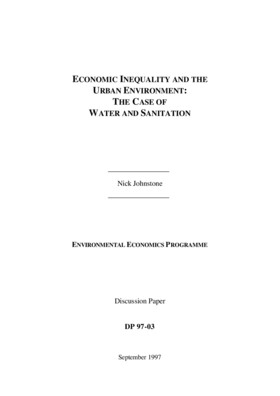Economic inequality and the urban environment: the case for water and sanitation

This paper looks at the relationship between economic inequality and urban environmental quality in developing countries, with specific reference to the provision of water and sanitation services. The paper explores the consequences of 'dual' systems, in which a proportion of a city’s residents are served by subsidised 'town' water and sanitation facilities, whilst another section of the city has been forced to develop a variety of 'on-site' strategies through their own efforts. A number of conclusions are reached: firstly, it is argued that poorer households are generally more adversely affected by low levels of provision and that standard project evaluation techniques perpetuate this bias; secondly, the cost structure of service provision implies that equal access to a standardised system is more efficient than the differentiated levels of access and treatment which prevail; and, thirdly, it is argued that access to water and sanitation and the means by which such systems are financed can be one of the most significant and effective means of distributing resources in the urban context.
Cite this publication
Available at https://www.iied.org/8093iied